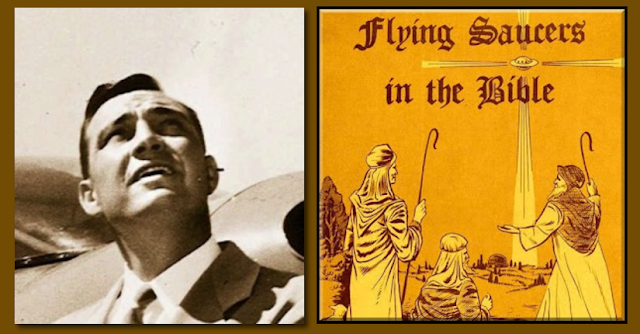Not all man-made flying saucers are hoaxes. Some are the attempts of enterprising engineers to duplicate the objects and performance described by flying saucer witnesses.
On February 3, 1953, an event at the University of Oklahoma marked the opening of their new engineering facilities. It was celebrated by a flying saucer launch. The press considered it a flop.
The launch was the cover feature of the March 1953 issue of Sooner Magazine, published for University of Oklahoma graduates and former students. While they acknowledged the larger model did not launch, they chose to emphasize that the smaller model had successfully launched.
The second essay was by a science fiction author, "The Sky's No Limit" by Dwight V. Swain, Instructor in Journalism. He discusses the far future of 1975, and the difficulty of imagining the unknown. A select quote:
As with so many of the most interesting UFO cases featured here at The Saucers That Time Forgot, Project Blue Book has no file on this incident.
 |
| Sooner Magazine, March 1953 |
 |
| The Daily Ardmoreite, Feb. 4, 1953 |
Lubbock Evening Journal February 5, 1953"Flying Saucer" Built By Students Falls First TestNORMAN, Okla., Feb. 5 —UP— Aeronautical engineering students at the University of Oklahoma Wednesday were trying to figure out why their "flying" saucer — 30-inch model—won't fly. The builders, with a large, ready-made crowd left over from dedication ceremonies for their new classroom-laboratory building Tuesday afternoon, came off red-faced when the shiny disc sputtered, whirled around a few times, and flopped to the ground. "Our smaller wind-tunnel models worked," mused the designer, Bob Winneberger, Oklahoma City. "Must be something wrong with this one." Winneberger had warned that the "saucer" might not fly, since it was finished in a dead heat with the dedication and he did not have a chance to test it.
The launch was the cover feature of the March 1953 issue of Sooner Magazine, published for University of Oklahoma graduates and former students. While they acknowledged the larger model did not launch, they chose to emphasize that the smaller model had successfully launched.
O.U. Engineering students have proved conclusively that flying saucers are possible. A small model, powered by rockets, delighted a crowd of 1,000 gathered to dedicate the Aeronautical Engineering Building on the North Campus as the saucer lifted, dipped and flew on. The dedication had CBS national radio coverage. Bob Winneberger, aeronautical engineering student, designed the saucer.
Beyond Human Ken
The Sooner Magazine issue also had a pair of thematically linked essays, the first on the history of aviation, "Up in the Air" by L.A. Comp, Professor of Aeronautical Engineering, who probably authorized the flying saucer demonstration.The second essay was by a science fiction author, "The Sky's No Limit" by Dwight V. Swain, Instructor in Journalism. He discusses the far future of 1975, and the difficulty of imagining the unknown. A select quote:
Consider, for example, the plight of the author or artist who creates "extraterrestrial life-forms" (what most folks call bug-eyed monsters) for pseudo-science magazines. Even with the accent on imagination and no holds barred, the boys still come up with relatively unoriginal (and unimpressive) variations on the familiar... In a word, no one can imagine anything truly beyond human ken, any more than a Stone Age savage could invent radar.That's worth thinking about, and even our understanding of UFOs could be a failure of our imagination, by thinking of them only in terms equivalent to our own aircraft. Nevertheless, exploring these kinds of ideas can serve as inspiration, and pursuing these dreams and visions can lead to making technological breakthroughs and new scientific discoveries. Along the way, there have been some missteps and bad launches. That's expected. What matters is that we keep at the work of reaching for the stars.
As with so many of the most interesting UFO cases featured here at The Saucers That Time Forgot, Project Blue Book has no file on this incident.


















































